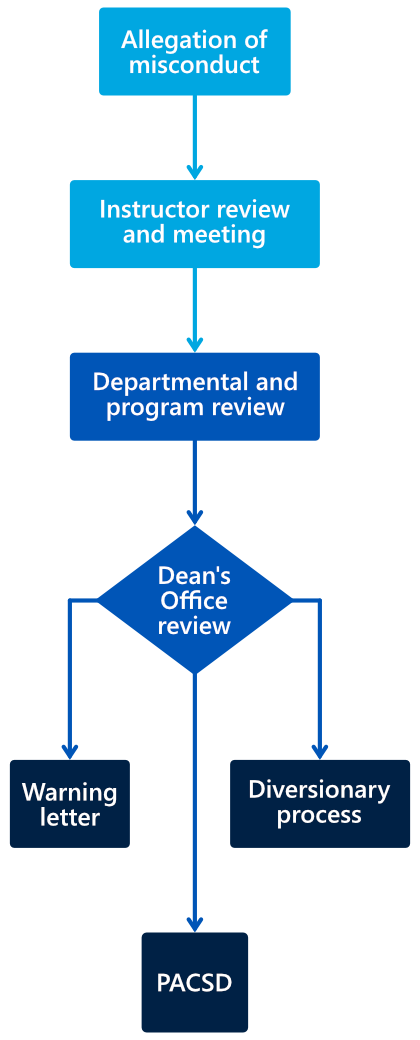Faculty and the Academic Misconduct Process
Understanding your role in the process.
Faculty members play an important role in educating students about academic integrity and they also have a role to play during the academic misconduct process. Allegations of academic misconduct start at the instructor level and each Faculty may have their own process for how cases are reported to the Dean’s Office.
Check out the best practices for communicating with students when dealing with suspicions of academic misconduct.
Instructor Toolkit
Guiding principles
Adopting an educative approach
UBC takes a shared values approach to academic integrity and misconduct inspired by educative principles.
Upholding responsibility
Reporting makes things fair for everyone and faculty have an important role to play in the process.
Supporting students
Academic misconduct can occur because a student was not connected to available support systems.
Academic Misconduct Process
The academic misconduct process considers if misconduct has occurred and determines what the outcome should be or whether discipline should be enforced.
The diversionary process offers the opportunity for students and Faculties to enter into an agreed plan of action around the most suitable outcomes, diverting the case from PACSD where appropriate. This can save time, involve less procedural complexity and avoid a disciplinary hearing while still producing a meaningful outcome.
This option is available for first time offenses, non-egregious misconduct, and where the student admits to the offense. Faculty and student must both agree to engage in this process. For cases serious enough to warrant the traditional disciplinary system, the PACSD option is still in place.
This is a general outline of the academic misconduct process providing a framework and overview of the main stages, and the process followed may vary case-by-case. Individual faculties may adopt their own procedures for reporting cases to the Dean’s Office.
Process Overview
1. Allegation
The instructor is usually the first to review the facts of the allegation of academic misconduct. The instructor might observe academic misconduct as it is occurring, they might suspect it based on their evaluation of the academic work or it might arrive as a report from another student.
Instructors should be aware of and review their Faculty procedure for dealing with allegations of academic misconduct. This may include specific procedures for reporting and recommended templates to use. If they are not aware of it, they should reach out to their Faculty contact responsible for academic misconduct or to their Department (usually the Associate Head).
2. Instructor review and meeting
Instructor reviews allegation
The instructor reviews the facts of the allegation, including the details of the case. If the instructor is not sure what constitutes academic misconduct, they should consult the Academic Calendars for examples or reach out to their department or to their program.
Instructor meets with student to discuss allegation
The instructor will usually meet with the student to discuss the alleged academic misconduct as well as any extenuating circumstances. When reaching out to a student via email, instructors may wish to review the best practices and the email template. During the meeting, as best practice, a note-taker should be present. The student is also allowed to bring a support person.
If a student presents signs of distress at any stage, instructors may consider activating an Early Alert or reaching out for further support.
At this stage, the instructor should confirm their initial allegation based on their review and their meeting with the student. All cases of suspected academic misconduct must be reported.
The thresholds between a learning moment and academic misconduct may vary between academic disciplines and due to the student’s situation (first-year student, upper-year student, grad student). Anything that is deemed to be academic misconduct must be reported. The regulation in the Academic Calendar is structured to provide further oversight over the instructor’s determination as the case may also be reviewed at the department or program-level and the oversight for all cases lies with the Dean’s Office.
If the instructor determines that the incident was a misunderstanding or a learning moment, then the process stops, no report is made and no record is kept. An educative referral can be considered to support the student’s learning and instructors may wish to connect the student to further resources around academic integrity or the specific skill in question. Learning moments may, depending on the criteria of the assignment, result in a reduction of the grade despite there being no academic misconduct.
Instructor reports allegation and informs student
If, following their review, the instructor confirms their allegation, they must report the incident. They should also inform the student of the outcome of their review and make them aware of the support that is available to them.
Reevaluation of the academic work
The instructor may reevaluate the academic merit of the student’s work at issue but is not permitted to impose disciplinary measures beyond this academic assessment. The instructor may require the student to re-do the work at issue or to do supplementary work in order to properly assess the academic merit of the student; or assign a reduced grade (including a zero) for the work based on the academic assessment of that work.
3. Departmental review
The Dean’s Offices of the Faculties can establish procedures for reporting suspected cases of academic misconduct. In some Faculties, this could mean additional steps following the instructor report including review at the department or program level.
4. Dean’s Office review
Dean’s Office receives allegation
According to specific Faculty procedures, an allegation may be seen by the department or the program prior to being reviewed at the Dean’s Office level.
Academic Hold
The Dean’s Office may report the initial allegation to the Registrar and to the PACSD. Reporting to the PACSD verifies whether there is an ongoing academic misconduct case against the student. At this point or at any other point during the ensuing process, an academic hold may be placed pending the outcome of the allegation. The Registrar will notify the student of the academic hold by email or by traditional postal mail using the e-mail or traditional mailing address provided by the student to UBC through UBC’s Student Service Centre.
Verification of academic misconduct record (prior incidents)
When an allegation is reported to the Dean’s Office, they will verify whether the student has a past academic misconduct record. This may impact the determination of outcomes of the current case: for example, it can prevent a student from accessing the diversionary path or it can escalate the outcomes if there are repeated offences.
A student’s academic misconduct record includes: warning letters, integrity plans, allegations of academic misconduct referred to the President’s Committee that have yet to be determined, and findings of academic misconduct by the President’s Committee and the President’s decision letters as to the appropriate discipline, if any.
Dean’s Office reviews the allegation
The Dean’s Office reviews the allegation and any recommendations from the instructor or the department/program level. This may include further review and gathering additional information. Students will have the opportunity to respond to the allegation and to discuss the allegation (if this has not already occurred with the instructor). Once the Dean’s Office has reviewed the allegation they will determine the outcome.
5. Outcomes
At the Dean’s Office level, there are four possible outcomes: no misconduct found, a warning letter, the diversionary process, or PACSD.
The Dean’s Office is required to send a copy of a warning letter issued by the Faculty to the PACSD (to the assistant for the PACSD at student.conduct@ubc.ca (UBC Vancouver) and pacsd.ubco@ubc.ca (UBC Okanagan).
On the subject of misconduct:
- If the Dean’s Office determines that no academic misconduct has occurred then the matter is closed. A record of the decision will be kept in the student’s file in the Faculty but the allegations will not be considered if any subsequent allegations of academic misconduct are made against the student. The student and the instructor will be notified of this by email.
- If the Dean’s Office determines that academic misconduct has occurred, there are three possible outcomes: a warning letter, the diversionary process, and PACSD. These outcomes may be impacted by whether the student admits to or denies the allegation of academic misconduct.
On the subject of admission/denial of academic misconduct:
- If the student admits to the academic misconduct, the misconduct is not egregious, and it is their first offence, the Dean’s Office may enter into an Integrity Plan agreement (diversionary process) with the student, send the student a warning letter, or refer the case to PACSD. If it is a subsequent offence, the Dean’s Office may send the student a warning letter or refer the case to PACSD.
- If the student denies the allegation, the Dean’s Office may issue a warning letter or refer the case to PACSD.
The Dean’s Office notifies the student of outcome of the review in writing and should also notify the instructor of the outcome of their review.
Warning letter
Warning letters are to be kept in the Faculty’s file and a copy is to be sent to the PACSD (to the assistant for the PACSD at student.conduct@ubc.ca (UBC Vancouver) and pacsd.ubco@ubc.ca (UBC Okanagan).
Diversionary process
The diversionary process includes the creation of an integrity plan between student and Faculty that should include proposed outcomes as well as educative support.
PACSD
As a general overview, the Initiator (Dean’s Office) submits a Statement of Case to the PACSD. The Dean’s Office informs the student and the instructor. Upon receipt of the Statement of Case, PACSD will set a date for the hearing and inform the Initiator and the student. At this stage, the student will receive a copy of the Statement of Case, as well as any evidence and a list of witnesses provided by the Dean’s Office. The student will be invited to respond to through the Statement of Response, which will also include evidence and a list of witnesses. A PACSD hearing will occur in the manner set out in the PACSD Rules and will produce a report for the President. The President will come to a decision, send a letter to the student (the “Decision Letter”) and provide copies to the Initiator and Registrar.
For an overview of what happens when a case is referred from the Faculty level to the PACSD, refer to the Rules for the President’s Advisory Committee on Student Discipline.
6. Student appeals of discipline
If disciplinary measures are imposed, the President will send a copy of the Decision Letter to the Senate Committee on Student Appeals on Academic Discipline. A student has the right to appeal any disciplinary measure decided by the President to the Senate Committee on Student Appeals and Academic Discipline (Vancouver) or the Senate Committee on Appeals of Standing and Discipline (Okanagan) . The Academic Calendars outline appeals procedures (Vancouver and Okanagan)

Important considerations for faculty
There are some essential things for instructors to keep in mind when they are involved in an instance of alleged academic misconduct with one of their students.
Graduate student misconduct
In the academic misconduct process for graduate students, “The Dean” means the Dean of the Faculty in which a graduate student is registered.
Best practices for communicating with students
- Review any templates on this website or those suggested by your Department or Faculty.
- Keep an open mind and approach the issue with neutrality and curiosity.
- Adopt a non-accusatory tone.
- Use plain language and avoid jargon or acronyms where possible.
- Consider the timing of the email and avoid sending it at a time when a student might not be able to quickly access support resources.
- Let the student know who will be present in the meeting (for example, an instructor for notetaking and observing).
- It is important to respond and discuss allegation of academic misconduct in a timely manner. The closer to the event that your conversation occurs is in everyone’s best interest.
- Aim to keep students informed of the outcome of the meeting.
Resources
This is an educative website intended to support understanding of the topics and associated processes and does not constitute legal advice nor impose legal obligations on the University. The content of this site may be updated. The Academic Calendar is the official governing document, and where there is any inconsistency or contradiction between this educative website and the Academic Calendar provisions governing academic integrity and academic misconduct, the Academic Calendar governs.





